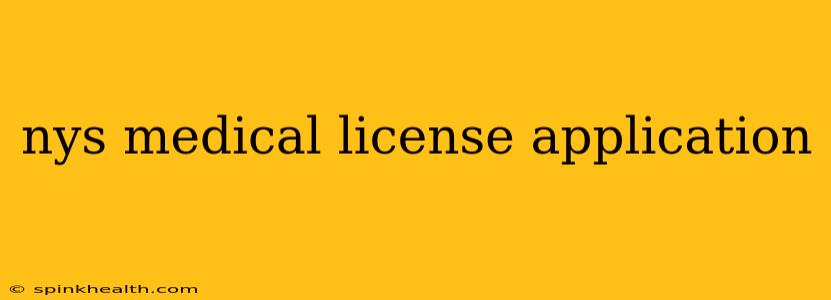The journey to obtaining a New York State medical license is a marathon, not a sprint. It demands meticulous preparation, unwavering attention to detail, and a deep understanding of the application process. This isn't just about filling out forms; it's about demonstrating your competence, character, and commitment to the highest standards of medical practice. Let's embark on this journey together, exploring the key steps and challenges along the way.
My own experience applying for my New York medical license involved countless hours of paperwork, meticulous verification of credentials, and a healthy dose of patience. This guide, born from that personal experience, aims to illuminate the path for aspiring physicians looking to practice in the Empire State.
What are the requirements for a New York medical license?
This is often the first, and perhaps most daunting, question. The requirements are extensive and vary depending on your background (e.g., graduating from a US medical school versus an international medical school). Generally, you'll need:
- Medical Degree: A medical degree from an accredited institution is essential. The New York State Education Department (NYSED) meticulously reviews the accreditation of your school.
- USMLE Scores: For graduates of US medical schools, strong scores on the United States Medical Licensing Examination (USMLE) Steps 1, 2 CK, and 2 CS are crucial. For international medical graduates (IMGs), the requirements are more involved.
- Clinical Rotations: Documented completion of accredited clinical rotations is a must. NYSED verifies these experiences rigorously.
- Background Checks: Extensive background checks, including fingerprinting and criminal history review, are part of the process. Any undisclosed issues can significantly delay or even prevent licensing.
- Professional References: Strong references from physicians who can attest to your skills and character are vital. These recommendations carry significant weight.
How long does it take to get a New York medical license?
The processing time for a New York medical license is notoriously variable. Expect delays. Factors contributing to processing time include:
- Completeness of Application: A thoroughly completed application, with all supporting documentation, significantly accelerates the process. Missing documents lead to delays.
- Background Checks: The thoroughness of the background checks can significantly impact processing time.
- Workload at NYSED: The sheer volume of applications can result in processing times that extend beyond initial estimates.
While some applicants might complete the process within a year, others may experience delays stretching to 18 months or more. Patience is paramount.
What are the fees associated with the New York medical license application?
The application process involves various fees, including:
- Application Fee: A substantial fee covers the initial application and processing.
- Background Check Fees: Fees associated with fingerprinting and criminal history checks are added costs.
- Other potential fees: Additional fees might arise depending on the specifics of your application and any required supplementary checks.
It's wise to budget for all anticipated fees and factor in potential delays that might incur additional costs.
What is the difference between a medical license and a medical registration in New York?
A medical license allows you to practice medicine independently in New York State. Registration, on the other hand, might be a preliminary step or apply to specific situations, like limited practice authorizations. The key difference lies in the scope of practice and the level of independent authority granted.
How difficult is it to get a New York medical license?
Securing a New York medical license is undeniably challenging. The rigorous requirements, thorough background checks, and comprehensive review process demand meticulous preparation and an unwavering commitment to excellence.
What are the common reasons for medical license application denial in New York?
Common reasons for application denial include incomplete applications, issues uncovered during background checks, deficiencies in education or training documentation, and any questionable ethical conduct during medical school or prior practice.
The journey to obtain a New York State medical license is a rigorous yet rewarding one. By understanding the requirements, anticipating potential challenges, and meticulously preparing your application, you significantly increase your chances of success. Remember, thorough preparation is your best ally in this process.

